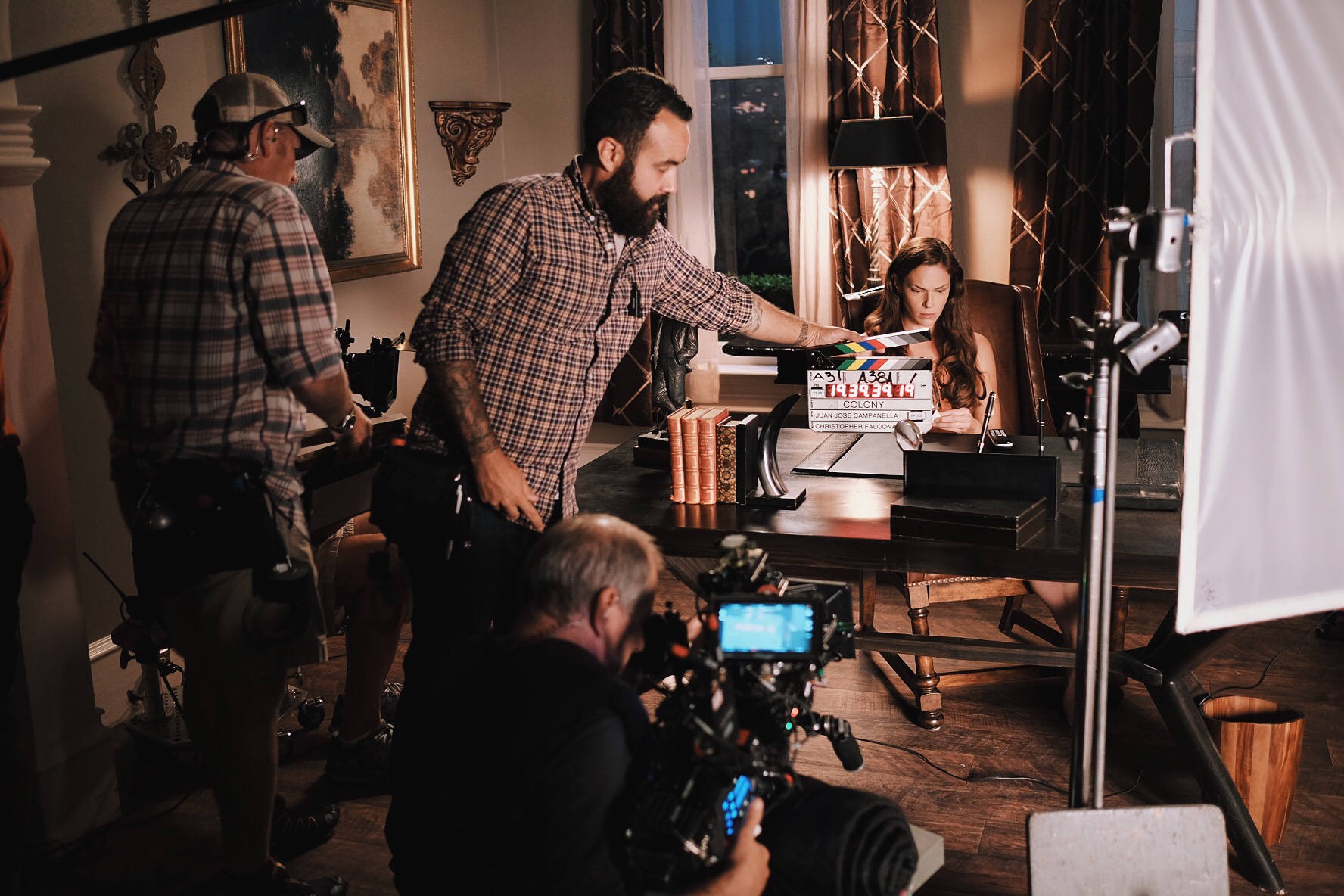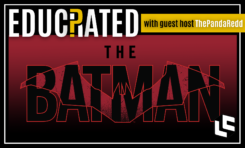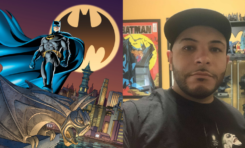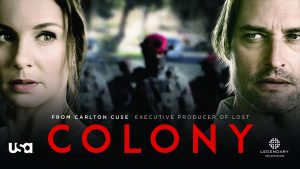
(USA Network)
In the shadow of the Hill Valley Clock Tower of Back To The Future fame and around the corner from what was the Roxxon Gas Station as seen in Agent Carter, a fight for the fate of humanity quietly wages. A diverse array of background actors ride bikes up and down the propaganda-lined street as they get several takes of Josh Holloway approaching and entering an office. His character, Will Bowman, is likely doing some sort of task for Colony Transitional Authority…or is he?
USA’s Colony is now one of the TV shows that film at Universal Studios Hollywood, which people on the backlot tour hear about but only see from a distance (if they’re lucky). The series, focused on the Bowman family’s struggle to stay together despite the strict proxy rule of a government representing an alien occupation, marks Holloway’s second series with co-creator Carlton Cuse but this is Sarah Wayne Callies’ first real foray into a genre she loves.
“I’ve always been in love with science fiction,” she began, seated underneath the Clock Tower yard trees with Holloway and Tory Kittles. “I guess I was born into the middle of the Star Wars generation and we watched Star Trek every week at my house. I thought the first season of Battlestar Galactica was one of the smartest conversations anyone had anywhere about the U.S. Patriot Act and so I’ve always wanted to be a part of science fiction.
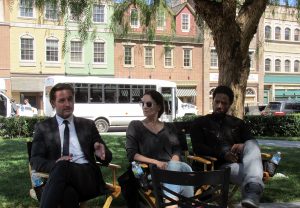
(Photo: Tamara Brooks)
“I guess maybe this is the first show I’ve been in that I would watch, as a viewer. I can’t watch The Walking Dead because it scares me and so this is something I come to as much as a fan as I do anything else… It’s exciting and I think science fiction…gives us an opportunity to explore things that might feel very close to home socially and politically, but it’s easier to explore them through fiction, and that’s a really exciting opportunity as an actor.”
Holloway is enjoying exploring his character for a second season. “Whereas Sawyer [from Lost] grew and evolved to be a better human, [Will] is a good guy who’s being tainted by the darkness,” he explained. “It’s not making him an evil person, but it is definitely…compromising his character.
“That is fun to play. I like playing things that are on the line; they’re not black and white, they’re right down the middle and you’re playing with perspectives. This show really plays with perspectives of what is good, what is bad. Who’s a terrorist, who’s a freedom fighter? When does a terrorist become a freedom fighter? It depends on your perspective.
“Like Lost, that did a lot of that jumping around perspectives, it’s a show that does that. And working with Carlton again, and his type of storytelling—Carlton Cuse and Ryan Condal—it’s big storytelling. The world unfolds, so it’s a patient unveiling of the story that the audience, they take the ride with us—with the characters, you know what we know. And it unfolds in that way. It gets bigger and bigger. I love that kind of storytelling. Each season can be different. Each season introduces another weave into the fabric of things and so it’s fantastic.”
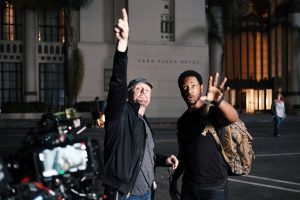
(USA Network)
For Kittles, who live-tweeted every Season 1 episode and had a “Twitter War” with co-star Peter Jacobson, the layered nature of Colony was too much to resist. “I’d done work in a few different genres—action stuff, some thrillers—but it was the first thing I’d read that actually had some elements from all of the different genres I’d worked in,” he said. “That was fascinating to me. In a lot of ways it was a mystery, so it was like True Detective. Like Sons of Anarchy you had, not gangs, but you had the occupation and you had the resistance, so you had this fight going on and then you also had the internal fights within those factions. It was the first thing that I’d read that had all of those elements and it was exciting for me because of that.”
Meanwhile the aforementioned co-creator/showrunner, Condal, served as the tour guide to the sound stage. He pointed out breakaway parts that made room for cameras, walked us through familiar and new “locations” (including one with a working water feature), and revealed what one of the in-progress builds would be.
With more space for interior sets and the wealth of options presented by the Studio streets, the move has made it much easier to open up and explore more of the show’s world. “Our joke is that eventually we’re just going to have to write the Jaws part of the Universal tour into the show, and just figure out a way to use Amity Island.
“It’s really been awesome, and we’ve really tried to take advantage of it this year. We have an incredibly creative production designer, line producer, and set decorator [Maria Caso, who he calls “the Macgyver of Set Design”] that’s able to make these spaces that we actually reuse—which you wouldn’t even know—look like different spaces from episode to episode. It’s really cool.
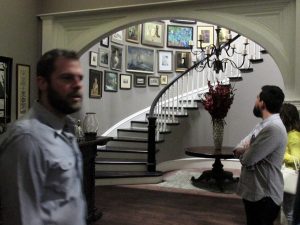
(Photo: Tamara Brooks)
“I look at this as I came out of this feature film writing world, this is what independent filmmaking is…or low budget filmmaking because you’re just trying to figure out new ways to do things, maximize production value. I think that, combined with our great creative direction, it makes the show look a lot glossier than the budget would suggest. We’ve figured out what we could do really well with the show and [we] lean into that. I just think we’ve all hit our stride this year. We see it as a bit of a reboot, a restart. A lot more sci-fi, much darker, much more aggressive. And still Josh Holloway and his great hair. Lots to come back for.”
Season 2 picks up about two weeks after Season 1 left off. “It’s enough time for things to have gotten worse,” Callies said with a laugh. But even with getting a broader look at the world and taking a deeper dive into its mythology, character building is still the focus.
As far as Will and Katie are concerned, “They have some damage to repair, obviously from Season One,” said Holloway. “We have had to put our relationship, our issues, one step behind the immediacy of our family and what we have to do. So it’s a slow building of our trust again. But it’s a great journey. Season two is a beautiful journey into that and them finding themselves again, and finding their love and their trust, and the core of what keeps this family together. It’s that journey.”
“We also go back in time. Prior to the arrival,” added Kittles. “So you’re going to get a glimpse of what these people were like before that ever happened. In Broussard’s case you find out a little bit why he is the way he is. Why he’s such a ruthless, nice guy.”
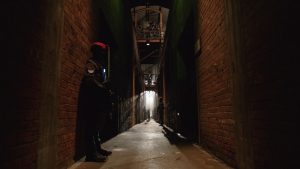
(USA Network)
“We wanted to feel time had passed. When we return to the LA Bloc, things have changed. There’s this much more oppressive veneer on the city… We wanted time for all that to settle in,” Condal said of where Season 2 picks up. “We also felt like we left the story in such a place last year that demanded an immediate pick up of storytelling, where you can’t let a huge amount of time pass…Telling a serialized story, it’s really important to break a story, [paint] yourself into a corner, and then find your way out of it. Helps keep it fresh and new. Make the people feel like they are on a train to somewhere.”
And now that train can move a little faster and farther with all the Season 1 tracks laid, without losing focus. “We had 9 episodes to tell the story—we had the pilot, then we had 9 more episodes. [We were] just trying to tell a very contained story to really get character work up off the ground… Sci-fi is usually expensive because…[you] need visuals to tell the story. We were just a lot more limited last year, I thought, than this year.
“We have more time to tell the story this year. Everybody knows the world now, so we can go into these different avenues and all that. It was definitely always the intent. It was founded as a science fiction concept. To us, the character work was always in the foreground, with the sci-fi in the back.”
Colony returns to USA January 12, 2017. Catch up on Season 1 on Netflix starting December 20, 2016 and visit usanetwork.com/colony for more behind-the-scene content and other goodies!
